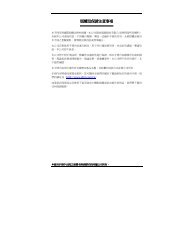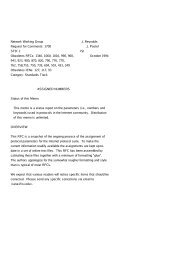Network Working Group R. Fielding Request for Comments: 2616 ...
Network Working Group R. Fielding Request for Comments: 2616 ...
Network Working Group R. Fielding Request for Comments: 2616 ...
Create successful ePaper yourself
Turn your PDF publications into a flip-book with our unique Google optimized e-Paper software.
<strong>Fielding</strong>, et al. Standards Track [Page 112]RFC <strong>2616</strong> HTTP/1.1 June 1999A cache MAY be configured to return stale responses withoutvalidation, but only if this does not conflict with any "MUST"-levelrequirements concerning cache validation (e.g., a "must-revalidate"cache-control directive).If both the new request and the cached entry include "max-age"directives, then the lesser of the two values is used <strong>for</strong> determiningthe freshness of the cached entry <strong>for</strong> that request.14.9.4 Cache Revalidation and Reload ControlsSometimes a user agent might want or need to insist that a cacherevalidate its cache entry with the origin server (and not just withthe next cache along the path to the origin server), or to reload itscache entry from the origin server. End-to-end revalidation might benecessary if either the cache or the origin server has overestimatedthe expiration time of the cached response. End-to-end reload may benecessary if the cache entry has become corrupted <strong>for</strong> some reason.End-to-end revalidation may be requested either when the client doesnot have its own local cached copy, in which case we call it"unspecified end-to-end revalidation", or when the client does have alocal cached copy, in which case we call it "specific end-to-endrevalidation."The client can specify these three kinds of action using Cache-Control request directives:End-to-end reloadThe request includes a "no-cache" cache-control directive or, <strong>for</strong>compatibility with HTTP/1.0 clients, "Pragma: no-cache". Fieldnames MUST NOT be included with the no-cache directive in arequest. The server MUST NOT use a cached copy when responding tosuch a request.Specific end-to-end revalidationThe request includes a "max-age=0" cache-control directive, which<strong>for</strong>ces each cache along the path to the origin server torevalidate its own entry, if any, with the next cache or server.The initial request includes a cache-validating conditional withthe client's current validator.Unspecified end-to-end revalidationThe request includes "max-age=0" cache-control directive, which<strong>for</strong>ces each cache along the path to the origin server to













